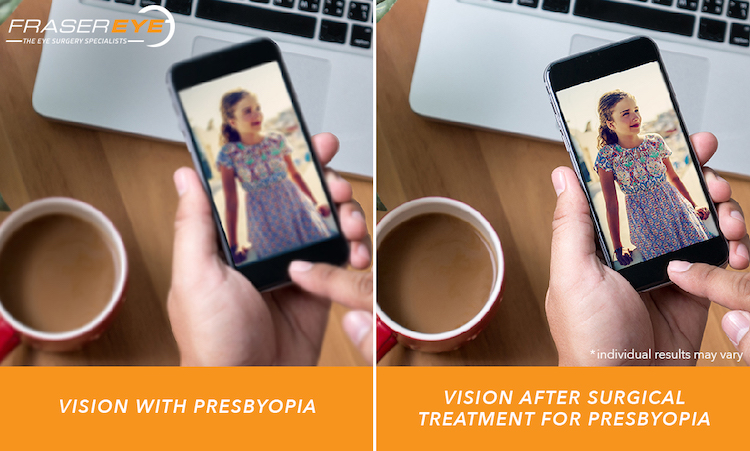The Fraser Eye Care Center Doctors have either authored or reviewed and approved this content.
The eye doctors at Fraser Eye are dedicated to providing eye care that improves the quality of life for patients in Metro-Detroit and throughout Michigan. Our presbyopia specialists offer a range of treatment options to improve near vision loss due to presbyopia.
Presbyopia is an age-related condition that diminishes the ability to focus at close distances. Presbyopia is commonly known for affecting reading vision, making it difficult to read books, tablets, phones, or even restaurant menus. This loss of near vision can also make other close-range tasks difficult, impede driving, and cause eye strain. Presbyopia commonly affects adults over age 40, and studies estimate that over 1.8 billion people worldwide have presbyopia.1
1 Global Prevalence of Presbyopia and Vision Impairment from Uncorrected Presbyopia: Systematic Review, Meta-analysis, and Modelling. Ophthalmology. 2018 May 9. pii: S0161-6420(17)33797-1. doi: 10.1016/j.ophtha.2018.04.013.
What Causes Presbyopia?
Your eye has a natural lens which works to keep objects in focus by adjusting for different distances. Presbyopia occurs when the lens begins to stiffen, which prevents your eye from shifting focus from distance to near vision. The stiffening or hardening of the lens occurs naturally with age. Presbyopia occurs gradually and symptoms include:
Is There A Cure For Presbyopia?
Presbyopia cannot be cured because the eye’s natural lens cannot be repaired once it changes due to age. However, there are many effective treatments to restore near vision. At the first signs of presbyopia, people may rely on reading glasses in order to regain near vision. While glasses can temporarily help with reading vision, they do have several disadvantages. Many patients do not like the look of reading glasses and worry that their “granny glasses” make them look older than they feel. Others are annoyed at having to take reading glasses on and off as they switch between tasks, which often leads to time spent searching for misplaced glasses. Luckily, there are other options to treat presbyopia.

At Fraser Eye, we offer several minimally invasive surgical options to effectively treat presbyopia.
Refractive Lens Exchange (RLE) – RLE is a procedure to replace the eye’s natural lens with a special lens called an intraocular lens implant (IOL). RLE is designed to correct a range of refractive vision errors, which means that in addition to correcting age-related vision loss, it can also treat any pre-existing nearsightedness or farsightedness to reduce or eliminate the need for glasses. Additionally, RLE can prevent the risk of cataracts. Learn More About Refractive Lens Exchange (RLE).
Monovision – Another technique that can be used to treat Presbyopia is by employing a technique called monovision, in which one eye is corrected for far distance and the other eye is corrected for near distance, which allows for the perception of overall clearer and more accurate vision. Monovision can be utilized with various different vision correction procedures including LASIK, PRK or Refractive Lens Exchange.
If you have been diagnosed with presbyopia, or if you have noticed changes in your near vision that you suspect may be due to presbyopia, then your best next step is to schedule a consultation with the vision specialists at Fraser Eye. Our experienced eye doctors will evaluate your vision, explain your options, and develop a treatment plan personalized to fit your needs.
We are committed to providing comprehensive vision care and advanced presbyopia solutions. Contact us with any questions or to schedule a consultation at one of our convenient Michigan locations.
The Fraser Eye Care Center Doctors have either authored or reviewed and approved this content.